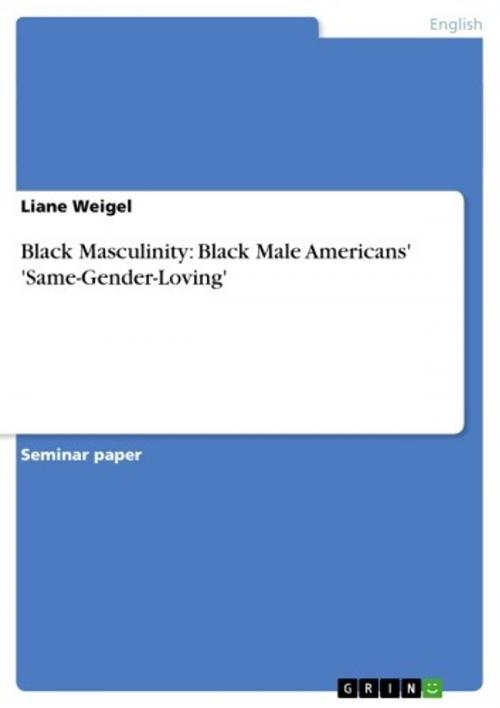Black Masculinity: Black Male Americans' 'Same-Gender-Loving'
Nonfiction, Entertainment, Drama, Anthologies| Author: | Liane Weigel | ISBN: | 9783638282000 |
| Publisher: | GRIN Publishing | Publication: | June 9, 2004 |
| Imprint: | GRIN Publishing | Language: | English |
| Author: | Liane Weigel |
| ISBN: | 9783638282000 |
| Publisher: | GRIN Publishing |
| Publication: | June 9, 2004 |
| Imprint: | GRIN Publishing |
| Language: | English |
Seminar paper from the year 2002 in the subject American Studies - Culture and Applied Geography, grade: Good, Martin Luther University (Anglistics/ American Studies), language: English, abstract: Concerning the topic of masculinity the first and maybe the most important question is: What is masculinity? - Defined as 'the quality of being masculine,'1 which means 'having the qualities or appearance considered to be typical of men; connected with or like men,'2 the term 'Black Masculinity' refers to 'the qualities of being masculine and black.' This definition sounds very logical at first sight. Moreover, when using this term as normative standard, 'the asymmetrical pendant to the more critically investigated femininity,'3 and therefore inventing fictional characters enacting or rejecting stereotypes of masculinity, it serves a certain order and makes life and abstract understanding easier. But if you reflect on the analysis of masculinity which should not be limited to 'typical male behaviour and sexuality' and which should not only be a matter of individual identity but the organisation and representation of the social, these formal definitions are too easy. Therefore masculinity in a wider sense is understood as a form of identity of men that cannot be isolated from other dimensions of identity. Social conditions of manliness and equality are always connected with issues of race, class, gender and sexuality. Especially within the ideological structure of a patriarchal culture, heterosexual masculinity has traditionally been structured as the normative gender. Therefore patriarchal culture has a simple interpretation of gay men: 'They lack masculinity,'4 which is reinforced by the statement: 'If someone is attracted to the masculine, then that person must be feminine.'5 These beliefs create a dilemma about masculinity for men who are attracted to other men, that means homosexual white men, but also black men, if you think of living in a multicultural society and consider the colour of skin. 1 Sally Wehmeier/ A S Hornby (1999), Oxford Advanced Learner´s Dictionary Sixth Edition (Oxford University Press), p.786. 2 Ibid. 3 Maurice Berger et al. (1995), Constructing Masculinity (New York & London: Routledge) p. 2 f. 4R.W. Connell (1995), Masculinities (Cambridge. Cambridge Polity Press, p. 143. 5 Ibid, p. 143.
Seminar paper from the year 2002 in the subject American Studies - Culture and Applied Geography, grade: Good, Martin Luther University (Anglistics/ American Studies), language: English, abstract: Concerning the topic of masculinity the first and maybe the most important question is: What is masculinity? - Defined as 'the quality of being masculine,'1 which means 'having the qualities or appearance considered to be typical of men; connected with or like men,'2 the term 'Black Masculinity' refers to 'the qualities of being masculine and black.' This definition sounds very logical at first sight. Moreover, when using this term as normative standard, 'the asymmetrical pendant to the more critically investigated femininity,'3 and therefore inventing fictional characters enacting or rejecting stereotypes of masculinity, it serves a certain order and makes life and abstract understanding easier. But if you reflect on the analysis of masculinity which should not be limited to 'typical male behaviour and sexuality' and which should not only be a matter of individual identity but the organisation and representation of the social, these formal definitions are too easy. Therefore masculinity in a wider sense is understood as a form of identity of men that cannot be isolated from other dimensions of identity. Social conditions of manliness and equality are always connected with issues of race, class, gender and sexuality. Especially within the ideological structure of a patriarchal culture, heterosexual masculinity has traditionally been structured as the normative gender. Therefore patriarchal culture has a simple interpretation of gay men: 'They lack masculinity,'4 which is reinforced by the statement: 'If someone is attracted to the masculine, then that person must be feminine.'5 These beliefs create a dilemma about masculinity for men who are attracted to other men, that means homosexual white men, but also black men, if you think of living in a multicultural society and consider the colour of skin. 1 Sally Wehmeier/ A S Hornby (1999), Oxford Advanced Learner´s Dictionary Sixth Edition (Oxford University Press), p.786. 2 Ibid. 3 Maurice Berger et al. (1995), Constructing Masculinity (New York & London: Routledge) p. 2 f. 4R.W. Connell (1995), Masculinities (Cambridge. Cambridge Polity Press, p. 143. 5 Ibid, p. 143.















